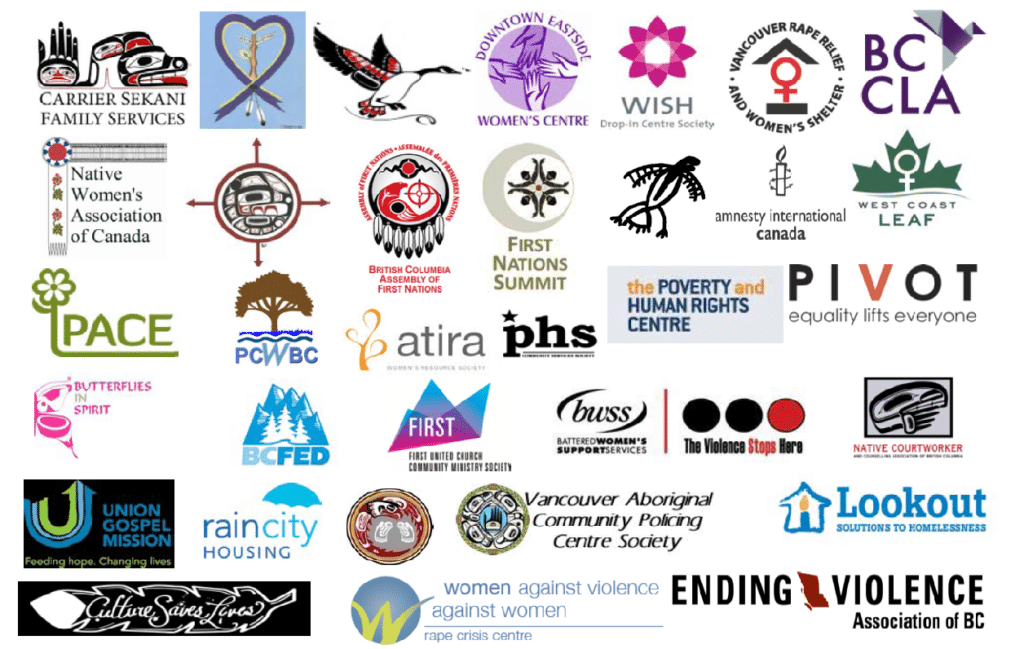(Coast Salish Territory/Vancouver, B.C. – August 3, 2016) Today a Coalition on Missing and Murdered Indigenous Women and Girls responded to the Federal Government’s announcement of the national Inquiry. The Federal Government has released the names of the Commissioners and the Terms of Reference (TOR) for the Inquiry.
The Coalition continues to demand justice for missing and murdered Indigenous women and girls. We have the following three main concerns with today’s announcement:
1. The Terms of Reference do not include a robust and binding commitment from the provinces and territories to participating in the Inquiry or implementing any recommendations that may emerge. The participation of the provinces has been described as supportive but there is no legally binding mechanism to compel the production of documents or other evidence. Without proper disclosure, the national inquiry cannot do its work.
2. Despite repeated calls for the explicit inclusion of policing in the Inquiry’s scope, policing is not mentioned in the terms of reference. The Coalition does not have confidence that the role of policing will be appropriately addressed.
3. The Terms of Reference fail to provide families with redress for inadequate police investigations
into their missing or murdered relatives. The TOR only provides the Commission with the authority to send families back to the local authorities whose very conduct is being questioned, providing no confidence that allegations of police misconduct will be meaningfully addressed. Decades of ceaseless work by women across the country calling for solutions grounded in Indigenous laws, has culminated in this Inquiry. The Coalition is pleased that the federal government has mandated the Inquiry to examine systemic causes of violence and has taken into account the needs of vulnerable communities and witnesses. However, given the importance and the promise of the Inquiry, we are deeply concerned about the gaps in the framework that stand to undermine the good intentions that have led to the formation of the Inquiry.
The Coalition calls upon the federal, provincial and territorial governments to address the critical gaps in the Terms of Reference and make a legally binding commitment to addressing violence against Indigenous women and girls. Without concrete commitments from the provincial and federal governments to systemic change, the Inquiry risks being more about words than action.
Amnesty International Canada
Atira Housing
Battered Women’s Support Services
BC Assembly of First Nations
BC Civil Liberties Association
Butterflies in Spirit
Carrier Sekani Family Services
Carrier Sekani Tribal Council, Tribal Chief Terry Teegee
Downtown Eastside Women’s Centre
February 14th Women’s Memorial March Committee
First Nations Summit
First United Church
Lookout Emergency Aid Society
Michele Pineault, family member
Neskonlith Indian Band, Kukpi7
PHS Community Services Society
Pivot Legal Society
Poverty and Human Rights Centre
RainCity Housing
Spirit of the Children Society
Union of B.C. Indian Chiefs
Vancouver Council of Women
Vancouver Rape Relief and Women’s Shelter
West Coast LEAF
WISH Drop-in Centre Society
Women Against Violence Against Women
The Coalition on Missing and Murdered Indigenous Women and Girls initially came together in response to the Missing Women Commission of Inquiry in British Columbia overseen by Commissioner Wally Oppal. The Coalition membership includes representation from families, survivors, Indigenous organizations, front-line service organizations, feminist and women’s organizations, legal advocacy sector, faith-based groups, and provincial organizations. Our breadth of representation and our experience with the Oppal Commission of Inquiry make the Coalition well-positioned to respond to and inform the national inquiry.

